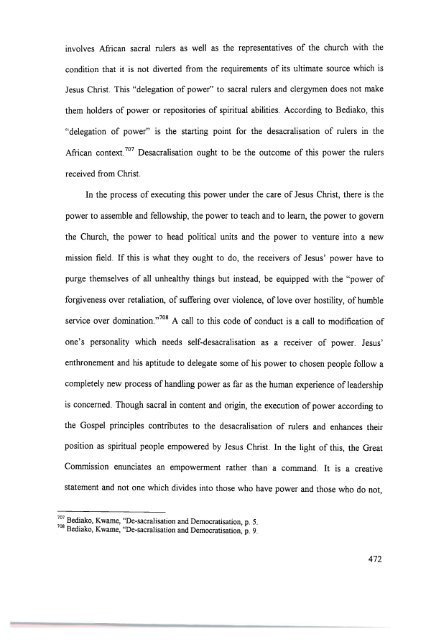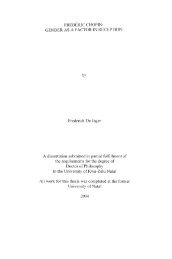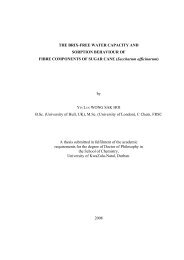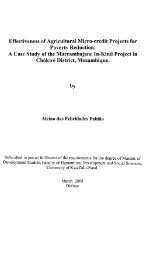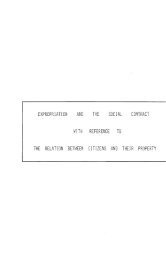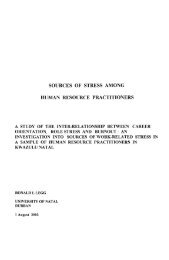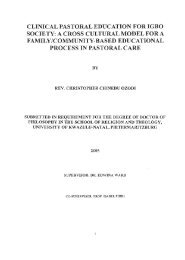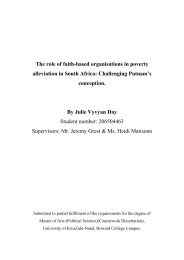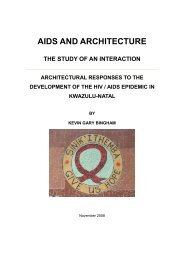- Page 2 and 3:
Table of Contents Dedication 3 Decl
- Page 4 and 5:
Declaration I hereby declare that t
- Page 6 and 7:
The next persons are the board of t
- Page 8 and 9:
Parallel to these scholars in the w
- Page 10 and 11:
Glossary A- Grassfields words and G
- Page 12 and 13:
B- Akan words and expressions used
- Page 14 and 15:
Okyenhene ruler ofAkyem Omanhene sa
- Page 17 and 18:
African sacral rule and the Christi
- Page 19 and 20:
the presence of a sacral ruler who
- Page 21 and 22:
empirical evidence to confirm the V
- Page 23:
or "Ohene,,7 in Akan - a king- but
- Page 28:
claim full membership in the Christ
- Page 31 and 32:
ecome an institution for the edific
- Page 33 and 34:
leadership vary from one society to
- Page 35 and 36:
3- Sacral rule as a mission field T
- Page 37 and 38:
points to the acceptance of sacral
- Page 39 and 40:
understood Christ' relationship to
- Page 41 and 42:
traditional leaders of the Bobo in
- Page 43 and 44:
eflection on the African re-appropr
- Page 46 and 47:
ulers make use of Christ and Christ
- Page 49 and 50:
accord him the religious attention
- Page 51 and 52:
missionary? Agyeman Badu and K.A. B
- Page 53 and 54:
on agreements and disagreements bet
- Page 56:
A- Presentation of Grassfields Gras
- Page 59 and 60:
same customs and therefore belonged
- Page 62 and 63:
with him. He set up a place for wor
- Page 64 and 65:
followers. 7o In his struggle for l
- Page 66:
share them with the one who overcam
- Page 69 and 70:
Fondoms (Kingdoms) never stopped ex
- Page 71:
In fact, they were ritual perfOJine
- Page 74 and 75:
From what had been said on history
- Page 78:
They are the nine or the seven with
- Page 81 and 82:
launching of a war, organisation of
- Page 83 and 84:
the growth of the lineage. The futu
- Page 85:
After these family ceremonies durin
- Page 89:
Cameroon, there are no slaves in th
- Page 92 and 93:
1- Matrilineal descent On the Grass
- Page 94 and 95:
prince to the status of Fo. That wi
- Page 96:
greatest support to the fondom with
- Page 103 and 104:
agrarIan Bantu local population. Th
- Page 105:
ad ones. lust as there are medicina
- Page 109 and 110:
it is concluded that God is pleased
- Page 111:
skull. He or she has the last \\lor
- Page 114 and 115:
Mount Mbet Nso' are common places o
- Page 116 and 117:
doors. The following information ab
- Page 118 and 119:
a leader or not. Those signs are ke
- Page 120 and 121:
the names like: FaSii (ruler who co
- Page 122 and 123:
offered by the head of family to th
- Page 126 and 127:
Bretuo, Ekona and Oyoko. 163 Intra-
- Page 128 and 129:
called "Odehye (the one who knows t
- Page 130 and 131:
the conquest ofa piece of land. 130
- Page 132 and 133:
method ofruling over non-Akan group
- Page 134 and 135:
ejected it by organising themselves
- Page 136 and 137:
debated with Ofori Kuma and his war
- Page 138 and 139:
Spiritual functions were overshadow
- Page 140 and 141:
centralise all the government of hi
- Page 142 and 143:
will to entrust someone from his cl
- Page 144 and 145:
D- Slaves in the Akan sacral rule P
- Page 146 and 147:
Panim. This was the start of a poli
- Page 148:
indicating authority through posses
- Page 151 and 152:
women. Although they compete strong
- Page 154:
while putting their sword on his ch
- Page 158:
and should never be contradicted; i
- Page 162:
shrines or sanctuaries for spiritua
- Page 165 and 166:
I pray you for strength)". Rattray
- Page 167:
of dependence on their fore parents
- Page 171 and 172:
political, the shrine's social acti
- Page 174 and 175:
satisfies partly religious and poli
- Page 176 and 177:
__worIdview. Like a mountain peak,
- Page 178 and 179:
2- The representative offree men ad
- Page 180 and 181:
language to use for evangelisation
- Page 182 and 183:
own rights. Power is invested in th
- Page 184 and 185:
elders, Stools, ancestors, spirits,
- Page 186 and 187:
displays at the palace. There are c
- Page 188 and 189:
God to clarify the matter. Elements
- Page 190 and 191:
social organisation, which is just
- Page 192 and 193:
imagination, the reality of the spi
- Page 194 and 195:
Israel,,283 and he commissioned his
- Page 197 and 198:
African spiritual worldview express
- Page 200:
ancestor worship, even if these act
- Page 203 and 204:
alien to the African spiritual worl
- Page 205 and 206:
God through the sovereign presence
- Page 207 and 208:
ehalf, and the blessing from God fo
- Page 209:
their business and not the ruler's.
- Page 215 and 216:
ightly said among all men according
- Page 217 and 218:
The third section looks at the sust
- Page 220 and 221:
to review the spiritual foundation
- Page 222 and 223:
elevate the African race by working
- Page 226 and 227:
Christianity was distorted to becom
- Page 228 and 229:
which often became tense. In German
- Page 232 and 233:
August Hennann Francke,349 known as
- Page 234 and 235:
Danish Missionary Society and the D
- Page 236:
Every member of the fellowship in H
- Page 240 and 241:
parliament member, proposed the cre
- Page 242 and 243:
This idea of the Christian village
- Page 245 and 246:
373 .. 1 b 1" 1 d the people, anima
- Page 247 and 248:
in the heart of many missionaries a
- Page 249 and 250:
During the age of Revolution (befor
- Page 251 and 252:
"They all failed except in Switzerl
- Page 253 and 254:
agreement. 386 Members of the pro-s
- Page 255 and 256:
salvation almost exclusively to God
- Page 257 and 258:
and practical view articulated in B
- Page 260:
Even though missionaries had to suf
- Page 263 and 264:
principles of an individual experie
- Page 265 and 266:
ights to promulgate them. 408 Blumh
- Page 267 and 268:
(praying is working).,,413 But his
- Page 269 and 270:
mission schools must serve as forer
- Page 271 and 272:
The temporal power ofthe missionary
- Page 273 and 274:
· 420 h P' .. B I activity above t
- Page 275 and 276:
Gospel. They felt a filial responsi
- Page 278:
with Alexander Fuller in Femand Do
- Page 281 and 282:
entire leadership of the mission wa
- Page 284 and 285:
y the Basel Mission on the day the
- Page 288 and 289:
Douala language. Dibundu was so bus
- Page 291 and 292:
When the Germans set foot in Camero
- Page 293:
Picture 2. Sitting from right are F
- Page 296:
"Des leur installation il jut permi
- Page 300 and 301:
Controversial reports about the sup
- Page 304 and 305:
territory. They came without guns,
- Page 306 and 307:
ecoming Christians themselves and t
- Page 308 and 309:
life and customs. A lot of photos i
- Page 310 and 311:
chretiens de la famille royale n 'a
- Page 313 and 314:
activities of the traders and farme
- Page 315 and 316:
February 1913. In March of the same
- Page 317:
and Magamba. When this missionary "
- Page 322 and 323:
"Un des problemes qui se posail ano
- Page 324 and 325:
y a temporary restoration of the an
- Page 326:
needed to find some other means tha
- Page 329 and 330:
catechists and evangelists was hars
- Page 331 and 332:
Grassfields history. In the Grassfi
- Page 334 and 335:
eplace Dieterle at the mission stat
- Page 336 and 337:
Chapter six: Introduction ofBasel M
- Page 338:
established a project for the impro
- Page 342 and 343:
Akuapem. By so doing, the tradition
- Page 344 and 345:
"How can you expect so much from us
- Page 346 and 347:
However, the Hall, Miller, Rocheste
- Page 348 and 349:
"Since the creation, most Africans
- Page 350 and 351:
(paramountcy) ceased to be between
- Page 352:
students such as Amoako Atta I of A
- Page 355 and 356:
instead, he patronised it and suppo
- Page 358 and 359:
was not an item in the Basel Missio
- Page 360 and 361:
"By 1877, European colleagues (of A
- Page 363 and 364:
Giving part of the land for mission
- Page 366 and 367:
elocated himself to Abokobi, the Ch
- Page 369 and 370:
Asante ruling class for the interac
- Page 372 and 373:
The Asante governing body had taken
- Page 374 and 375:
Contrary to the Pietist movement, t
- Page 376 and 377:
Conclusion: African Sacral rule and
- Page 378 and 379:
vocabulary and notions. He was the
- Page 380 and 381:
complemented the missionary's attit
- Page 382 and 383:
African community. The Pietistic at
- Page 384 and 385:
mission had been one of the attract
- Page 386 and 387:
The conversion processes which aime
- Page 388 and 389:
the entire hierarchy of sacral rule
- Page 392 and 393:
mitigate the crime that had been co
- Page 395 and 396:
church leaders have to develop some
- Page 398:
Ta Henoch was a renowned herbalist
- Page 402 and 403:
missionary to train Mongwe Michel w
- Page 405 and 406:
other Christian. I just propose tha
- Page 407:
Since the Bamun Fa Njoya enthusiast
- Page 410 and 411:
after serving for a while. The sacr
- Page 412:
ecome Christian. He "wanted the sac
- Page 416 and 417:
hindrance. 625 With the kingmakers
- Page 418 and 419:
e. That I will appoint a caretaker
- Page 420 and 421: IV-The Presbyterian Church of Ghana
- Page 422: customs. Northwand presented himsel
- Page 426 and 427: promoted the idea, supported by Nan
- Page 428 and 429: hosted the General Synod of the aut
- Page 430 and 431: in missionary circles, the Okyenhen
- Page 432: elationship as the Okyenhene's Memo
- Page 436 and 437: odyguards to school and thus showin
- Page 438: his acceptance as a full member of
- Page 443 and 444: without any official letter in Bafu
- Page 445 and 446: traditional community, gave certain
- Page 447 and 448: Chapter Eight - General conclusion:
- Page 449 and 450: sacral rule accept responsibility f
- Page 451 and 452: church. Nevertheless, they have gat
- Page 453 and 454: values and other indicators of thei
- Page 455 and 456: institutions who are able to identi
- Page 457 and 458: It is not surprising that it was th
- Page 459 and 460: traditional political authority and
- Page 461 and 462: endered in the English language: to
- Page 463 and 464: they did not give open access to ev
- Page 465 and 466: words, they occur at the same time
- Page 468 and 469: is conveyed by aionos is absent. Ti
- Page 472 and 473: thus alienating one from the other.
- Page 474 and 475: ehaviour should be Christlike. The
- Page 476 and 477: Christ is Lord of both, and African
- Page 478 and 479: Paris, Payot, 1925. -Antui, J. Dani
- Page 480 and 481: - Chem Lamghee, B. and others- Nso'
- Page 482 and 483: - Ela, Jean-Marc, African cry, New
- Page 484 and 485: sociale et politique de I'Eglise au
- Page 486 and 487: 1989. _ Mbiti, John, Bibel und Theo
- Page 488 and 489: _ Pierard, Richard V. "Zinzendorf',
- Page 490 and 491: _ Schaf, Ype, On Their Way Rejocing
- Page 492 and 493: Rulers Lists of Interviews Clergy G
- Page 494 and 495: Clergy 1- Dideh MOlse (71) Porto No
- Page 496 and 497: 28- Totso Chretien (86), Bandjoun-D


